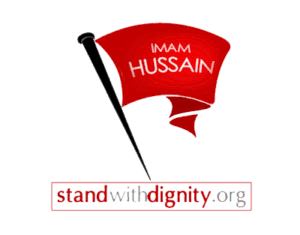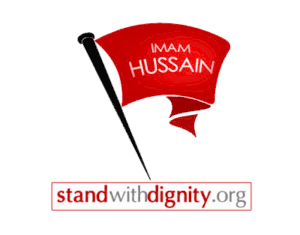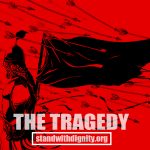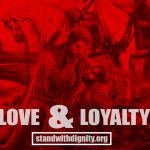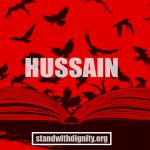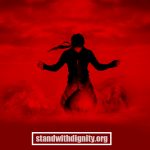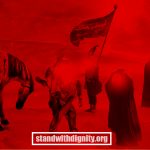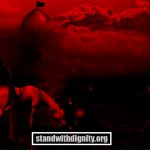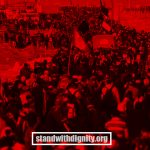By Mr. Michael Muhammad Knight
Michael Muhammad Knight is an American novelist, essayist, and journalist. His writings are popular among American Muslim youth. Within the American Muslim community, he has earned a reputation as an ostentatious cultural provocateur.
He obtained a master’s degree from Harvard University in 2011 and is a Ph.D. student in Islamic studies at the University of North Carolina at Chapel Hill.
Prayer is better than sleep
Bleeding for the Imam: Heartbreak and Catharsis in Muharram
“I shall cry blood for you instead of tears.”
–Imam Mahdi
First off, the whole thing has left me too tired for Shi’a/Sunni hadith-tossing contests over whether self-injurious behavior has any place in Islam. Besides, that’s religious question and this wasn’t completely about religion. Part of me just wanted to soak in some deliberate heartbreak, manifested through a man that happened to be Prophet Muhammad’s grandson. And part of me wanted to bleed again, because it had been a long time and I almost missed it.
I used to wrestle in rings made of barbed wire. My heroes were guys like Mick Foley, Terry Funk and Sabu (billed as “the most homicidal, suicidal and genocidal man in professional wrestling”). Five years later I still have a puffy scar on my left arm that looks like a wad of bubble gum, a bumpy scar on my head from Kid Kato’s botched choke slam and a floating chip of bone in my elbow from a Thumbtack Death Match. The wrestling was performance art but the blood was real. Sometimes I’d get smashed in the head with a steel chair and would sell it by cutting myself with a hidden razor blade. The blood would trickle down my face and our audience believed it was from the chair-shot. Of course, you don’t have to fake getting tossed into barbed wire; I have permanent white scratches on my arms and legs.
People asked how I could continue a match with my head split open or dozens of thumbtacks stuck in my skin when the truth was that it only pushed me harder with a sudden and euphoric adrenaline lift. Pain can be like the body’s natural morphine. The storm of endorphins didn’t only come from the wound itself; sometimes I’d get a tingle in my spine from just watching the blood crawl out of a new cut. That’s a survival instinct kicking in; you see yourself injured and your body wants to alarm you with all of wonderful neurotransmitters. Mash’allah.
When the rush wore off I’d usually be sitting in the shower, watching red water swirl around the drain. It’s a warm slow dizzy. Like being drunk. You don’t have to be Shi’a to get that. I knew a girl with cross-hatched razor scars on her arms and she had never heard about any of that Karbala stuff, she was just a regular kafr. Hazrat Iggy Pop used to cut himself on stage, but I don’t know what madhab he followed.
I did have myths to uphold in Muharram, but they weren’t all Muslim. I grew up Irish Catholic. When I was five Gramps would walk me to Church on weekday mornings to sit down and stand up and sit down again and stand up again and keel on the padded kneeler before a tall bloody Christ with spikes driven through his palms and a crown of through his palms and a crown of thorns pressed into his head and his deep sunken eyes gazing up at the church ceiling as though at the precise second where he asks why he had been forsaken. Reliefs lining the walls depicted the Twelve Stations of the cross and Gramps would take me around the church, reading Christ’s story in stone. As a kid I didn’t know what it all meant beyond that bad guys wanted to kill Jesus and he let them but he only let them because he loved me so much. That was a hard concept to grasp, but they call these things mysteries.
At St. Francis Desales High School they sent us on spiritual retreats with the late Father Dave. One year he gave each of us a wooden match and then passed around a tin cup. When the cup came your way you’d have to drop your match in head-first so it made a clink sound-like a hammer striking the head of a nail. As the cup went around the room, nobody said a word. Each clink symbolized us-you, me, all sinners-driving a nail deeper into Christ’s hand.
I’m no anthropologist but Blood Atonement could be the world’s oldest religious idea, so old and deeply rooted that it doesn’t even need religion. Tell me we don’t love the fact that Malcolm X knew he’d die a violent death and just marched into it anyway. In his eulogy Ossie Davis called Malcolm “our own black shining prince…who didn’t hesitate to die, because he loved us so. “That’s Hussain-thought right there, or maybe Christ-thought. Or Dionysius-thought, or something from even farther back. And you can find it on both sides of 9/11.
Approaching Niagara Falls on the sixth of Muharram I thought of all the times I had gone to Canada for bad things, hoping a few drops of my blood could wash that out. Then Cold play’s “Yellow” came on the radio-what a sweet song but hear it while on your way to a ritual cutting party and the light-heartedness of Chris Martin singing “for you I’d bleed myself dry” is so absurd and inappropriate it’s darkly funny. When I arrived at the border I figured I’d be in for less harassment if I just said I was going to a strip club.
“Which one” the border cop asked.
“Seductions.”
“Oh yeah? Where’s that”
“Down on Lundy’s Lane, right by Sundowners.”
“Okay,” he said’ waving me on. The test passed, I drove on to Canada.
On the QEW headed towards Toronto I wondered what the hell I was doing. I wasn’t even a regular Shia; if this Ahlul-Bayt scene was only a heresy, then I was a heresy of a heresy. Like the Mughiriyya I say Allah is a man-shaped Light. Like the Mu’ammariyya I neglect my prayers. Like the Ghaliya I say Ali is fighting his enemies above the clouds. Like the Khattabiyya I want a vocal prophet and a silent one. Like the Sabaiyya I want my Imam back. Like the Tayyariyya my soul will transmigrate into a camel, then an inferior animal, then an animal inferior to that, and so on until I am worm thriving in feces and I keep going down until my soul inhabits clay and iron and mud and I am tormented in fire.
Like Allama Iqbal I am one who weeps for the Martyr of Karbala.
I first learned of Hussain in time when Islam was falling apart for me. My estrangement had seemed to come from all angles; when someone today asks how I became an apostate, I don’t even know where to begin. I had burned out on the demands of Wahhabism and was beginning to question things about Prophet Muhammad’s life. I worked overnights as a janitor, which interfered with my daily prayers. I’d get off work at five in the morning, make Fajr and then sleep through my Zuhr and Asr. I technically kept the Ramadan fast but barely noticed because I slept all day. Just sitting next to a female would cause me to tremble uncontrollably. I hated myself. Not only had I conked out as a Muslim, but I had become a guilt-ridden mutant incapable of what I perceived as a “normal” American life.
Then I read of everything that Hussain had gone through-his mother Fatima, the Prophet’s own daughter being trampled to death by men who claimed to be Muslim; his father Ali brained with a poison-tipped sword; his older brother Hasan assassinated to secure power for a criminal named Yazid; the Islamic community so divided against itself that the Prophet’s widow Aisha ordered arrows to be hurled at Hasan’s corpse. At a time when everything for which his grandfather had fought and struggled was sullied in a civil war that killed ten thousand Muslim, Hussain declared his intention to make the Hajj-not in Mecca, but Karbala-where he’d perform the pilgrims’ sacrifice not with a goat but his own blood.
It may be worth noting here that Karbala can be broken into two words: karb, meaning grief or sorrow, and balaa, meaning affliction. The land site in modern-day Iraq.
Yazid, whose father had been the rival to Hussain’s father and whose grandmother had chewed the liver of Hussain’s great-uncle on the battlefield of Uhad sent his army to Karbala, Hussain’s had with him his wives, children and friends. Yazid’s force numbered in the thousands. The army surrounded Hussain’s camp and cut off his access to the Euphrates River.
Cradling his six-month old son in his arms, Hussain walked to his enemies unarmed and without escort. Regardless of how they felt about him, he pleaded, his baby had done nothing to harm them; could he at least have water? One of the soldiers then fired a blow dart that went through Hussain’s arm and pierced his son’s neck, pinning them together, Hussain went to wipe his baby’s blood on the earth, but the earth cried that it could not bear such holy weight; he then offered the blood to the sky, but it too refused for fear that it would fall asunder. So Hussain smeared the blood on his face, took the dead baby back to his camp and picked up his sword.
Yazid’s army made short work of Hussain’s defenders; soon the Holy Imam was alone. Stuck with arrows and covered with wounds, his blood streaming down the side of his white horse, Hussain sheathed his sword and made one last plea for the soldiers to remember how kindly his grandfather had treated them. He even offered to leave the Muslim world so Yazid would no longer view him as a threat to his power. Finally, he warned them of the eternal consequences that could come with taking his life. He knew that nothing he might have said would change his fate, but Hussain did not mean it for the soldiers’ ears; he said it for history. In giving these men one last chance to put down their weapons, he exposed the corruption of Yazid’s regime for all time.
He then noticed that it was time for evening prayer and slid down from his horse, only to find himself impaled on the ground by the arrows still protruding from his body. He passed out. In a dreamlike state Hussain felt the presence of heroes earlier times: Abraham, Moses, Jesus, his grandfather Muhammad and father Ali, all grief-stricken though each of them turned away rather than watch him suffer. Then the spirit of Fatima descended upon him and cooled his forehead with her hand, vowing that her son would not be alone in his final hour.
He awakened, pulled himself up and prepared for his last salat. With no water for wudhu he performed tayammum with the burning sand. It was during Hussain’s prayer, his face lowered to the ground that a soldier walked up and chopped off his head.
The details vary. This was the story as I knew it.
They rode over his body with their horses. His head was stuck onto a spear. The widows and orphans were imprisoned. Hussain’s horse neighed and cried and galloped off into the desert. The sky turned red with shame for what it had seen.
Hussain’s murder was cathartic; Islam had failed Muhammad’s own grandson more than it had me, and he hurt for it in ways that I’d never know. If someone wants to pull up history and scripture to refute these Shi’a melodramatics, have fun-but you’re missing the point of mythology. I don’t even need the story to be true; there are people that get like this star wars.
I got off the QEW at Hamilton and turned onto a side-street, passing a rope-chain manufacturer and gray concrete recycling plant before I came to an empty fenced-in parking lot. The mosque looked like it could have been a regular house, apart from the sign reading “ISLAMIC CENTRE” with much of its paint scratched off. It had grimy aluminum siding and was stained with rust from the bars over a window.
I parked and wondered how far I could really go with this; but how can you face Hussain’s mother on the Day knowing that you half-assed your matam?
Matam is the sanctified self-abuse in which mourners of Hussain take to their own skins with knives and hooks and chains. Popular forms of matam are zanjir-zani (self-flagellation) and qamma-zani (forehead-cutting), though some Shi’as have also walked on fire-but I can’t remember what zani that is.
The parking lot was empty. I sat in my car and flipped through a booklet designed for teaching children how to pray. The kid on the cover cupped his hands up by his chest instead of folding them above his navel; what was that all about? Everything I know about prayer I had learned as a Sunni. The Shia’s did it their own way.
This kid on the cover might have looked as Hussain did when he was a child, besides the flannel shirt and slacks. Hussain’s grandfather used to put him on his lap and say things like “I see you weltering in your own blood”. What was it like to be so young and hear that stuff? I realized that I was getting weird and opened the car door just to reconnect with the outside world. It was put-or shut-up time. I got out of my car and went in the mosque.
The kindly imam met me at the door and showed me where to put my shoes. Since no one was there yet he showed me the women’s section, then the men’s. They were basically halves of the same room, divided by a solid wall. I tried hard to impress upon him that I wasn’t new to Islam but part of me felt like I was. I had never been in a mosque that had pictures on the wall of a white horse without its rider, or banners with Hussain’s name and pictures of hands everywhere (the five fingers symbolizing Muhammad, Fatima, Ali, Hasan and Hussain). I spotted a wall-hanging of the Kaaba and felt relieved that at least something was familiar.
Soon enough the room filled with brothers. A visiting scholar from the Pennsylvania sat before us and gave a take in English, then said that today we would remember the martyrdom of Hussain’s young nephew Qasim and launched into it-out of nowhere he began screaming the story in Urdu and crying and holding his head in his hands while all the brothers up front lowered their heads. Occasionally someone yelled in Arabic and others would yell their replies. Nothing in my Sunni experience could have prepared me for this. Six teenagers entered the room carrying a little coffin on their shoulders and everyone stood up to touch the shroud that covered it. Younger boys followed with plates of fruit and cake. One had a plate of lit candles and brothers would wave their hands over the flames.
Then the men formed two columns facing each other. While a brother at the front of the room wailed in Urdu or maybe Farsi, they swayed back and forth and slapped their chests hard. Left, right, bam, bam and you could tell which guys were getting into it because they moved their whole bodies and swung hard with full arm extension. One guy kept yelling something and everyone would yell after him; I think he was saying Ya Ali but I’m not sure. At certain spots we chanted Ya Hussain, Ya Hussain. I closed my eyes and zoned out on the rhythm of forty or fifty men beating their chests in unison and then I did it myself, my right hand coming down hard on my left peck. It stung but I kept going, trying to picture how pink it’d get under my Dropkick Murphy’s shirt, Sometimes I flexed my pectoral to brace for the hit. Sometimes I hit harder than others. If I found myself going easy I’d remember Hussain’s mother, curl my lip and raise my hand higher before bringing it down. Some guys were going harder than I could fathom, just straight beating the shit out of themselves. Even kids that looked to be in seventh or eighth grade were slapping hard. Men took turns reading the poems. The intensity of hitting seemed to match whatever was going on in the recitation. At time the reading would slow down and we’d slow down our slaps, but then he’d pick up and everyone smashed their chests even harder than before. I wondered how long they’d go, and what was next-would someone whip out a dashna and smack his forehead with it? Where were the swords and chains?
When the chest-beating (sineh-zani) was done, the kids brought out dinner and tea. The imam sent a couple of high-schooler’s over to sit with me. They asked the same questions that I’m asked in every mosque. I gave my standard answers of 1) I was raised Roman Catholic, 2) Malcolm X’s autobiography inspired me to learn more about Islam and it just snowballed from there, and 3) my mom was totally cool with it– in fact she drove me to the mosque for my first shahadah. I asked if anyone at that mosque did more of the sever stuff, like whipping and cutting and such and they said nobody did that in Canada but you could find it overseas. One of the kids told me that in Pakistan they had stories of men going so far with matam that they died, only to miraculously come back to life and even their awful scars would disappear. The kid said that I was a hero to him because while he had been born Muslim and it was all he’d ever know, I sought out the truth for myself – not only to go from Christian to Muslim, but Sunni to Shi’a and wanted to hurt myself again because he had no idea of how grubby I had turned out. I told him that I had highs and lows and let it end there.
I left the place feeling so good that it depressed me at the border to claim I had gone to a strip club. But for the seventh of Muharram, I wanted more. Back in Buffalo I went online to find another Shi’a community, hoping that I could get into zanjir-zani or at least qamma-zani. Turned out there was a Shi’a mosque less than an hour from Buffalo, and on this side of the border in Medina, New York.
So the next night I got off 1-90 at exit 48-A and drove around Medina looking for west Avenue, just loving the fact that the town was called Medina and full of signs saying things like “Medina Mini-Mart” or “Medina Liqour.” But the mosque was dead-doors locked, lights off, no cars in the driveway. I found a flier taped to the side-door window telling me to go back to Buffalo and hear a lecture at the University’s North campus in Amherst. Pulled in at a truck stop on the way back and found a 16×20 framed drawing of Jesus with beads of blood rolling down his forehead and a tear on his cheek, and with the hair and beard and robe and heroic gaze he looked just like pictures of Imam Hussain I had seen on the internet, So I bought it. And if anyone asks, it’s Imam Hussain.
I arrived at the University, found screening room 112 and felt like a creep. Everyone seemed to sit by the aisles, so the only seat available to me without crawling over people was in the front row. The Maulana was going on about how you can find no instance of Abu Talib’s kafr causing any harm to Islam, or Abu Sufyan’s Iman helping it. For a moment I felt an incredible sense of relief, as though it somehow related to me. The scholar made some great points about the Ahlul-Bayt but remained respectful of the Sunnis; even if Sahih Bukhari slighted Ali, he told us, it was a holy book and we should all own a copy. I own a copy but haven’t opened it in about four years.
The Maulana told us of Imam Hussain gathering the body parts of Qasim in his robe and carrying them to Qasim’s mother. After the talk a neatly-dressed man came to the podium with his forehead carved up like Bruiser Brody and wept as he recited. I could hear a man sobbing behind me. Then we all stood up and placed our hands on our hearts. I thought of the gruesome stories and the previous night’s funeral procession and all the passion of men crying and slapping themselves for an event from centuries ago, realizing that what I missed in going from Catholic to Sunni could be fulfilled in the throes of Irrational Shi’a Love. It almost feels good to get sad, to cultivate a grief so thick it can coat your stomach like Pepto-Bismol. Again, I don’t think it to be a religious thing.
We did maybe five minutes of chest-slapping, prayed and then everyone went home. The next night I went back to UB but the lecture went so long we had no time for matam at all, we just prayed and left. I doubted that I’d ever get to see hardcore matam. I had only until the tenth night of Muharram to find some holy cutters and this was already the seventh, Down in Jamaica, Queens they had a mosque that did zanjir zani but I lacked the funds for another long drive.
Monday the ninth of Muharram I drove my friend Tundy to the liquor store on Grant so he could cash his check. In front of the store stood a life-sized statue of a white horse, flanked on either side by haggard old guys with brown-bagged bottles. While Tundy waited in line I stayed outside and sat on the curb, pretending that the horse’s shade protected me from a hot Karbala sun though it was the beginning of March in Buffalo.
Slightly burned out on the sadness angle, I skipped that evening’s lecture and kept to myself. Though far removed from the Shi’a scene, I considered that it was the eve of Hussain’s murder and made it a quiet night.
Tuesday I drove back to Medina and attended my first observance of Ashura. The Alim from the UB lectures explained why Hussain’s martyrdom saved the entire Earth and all that it contained: Shi’as, Sunnis, Christians, Jews, and Hindus and on down the line. He told the story while we all put our heads down. The youths carried out a replica coffin, draped in a white sheet that had been splattered with replica blood and followed by a parade of smaller kids carrying flags topped with hand shaped ornaments. The coffin was placed on the floor and we rose to surround it. As someone began the recital I felt as though we were at a real funeral, and for a moment I imagined that the soft carpet was hot send. The man had a beautifully nasal, almost feminine voice. Having entered Islam as a Sunni, it made me briefly uncomfortable to hear poetry and singing in a mosque but I got over it fast. When the tears came I tried to spread them to as much of my face as I could, hoping they were the tears that could shield my face from the Fire.
After prayer we set on the floor for dinner. I had rice and I am not exactly sure what else, but it was spicy and good. The brother seated next to me talked about Muharram celebrations he had seen in Africa and the different ways in which they did things. “Everyone observes it their own way,” he told me. He said that some scholars issued fatwas banning matam altogether, though others allowed it as long as there was no serious or permanent injury. Then he had explained that matam originated when those who had declined to join Hussain at Karbala heard the news of his death and beat themselves with remorse. I had heard another story that it was started by Hussain’s sister. One version had her beating her head against the bar of a carriage; another said she smashed her head on the bars of a cell.
On the way home I stopped at Wegmans and purchased four packs of brass-plated thumbtacks at ninety-nine cents a pack. Through the clear plastic I could see my reflection on the heads. They made a ratting sound when I shook them.
“For home, school or office,” it said on the package. Or matam.
At home I spilled my four hundred thumbtacks on the floor and gathered them closer together. Some were on their sides but most had their points straight up. From a few feet away it looked like sprinkled gold. I took off my shirt and thought of the Maulana breaking down as he described Hussain standing before Yazid’s army. The Maulana had asked us to imagine thousands of archer’s aiming at a single target. I tightened my body and threw myself down.
Ya Hussain, Ya Hussain.
Back when I wrestled in thumbtack matches I’d always do my own tack-bump rather than let the other guy toss me. I’d stand in front of the tacks, he’d give me a clothesline and I went crashing backwards of my own volition. I tried to flat-back bump but as often as not I’d lean to my left; sometimes I went completely sideways and got the bulk of them stuck in my arm. Falling on thumbtacks isn’t to so bad if you’re already fired-up from wrestling; its worse when the match is over and you’re calming down but the things are still in you.
This time I again went sideways and most of what stuck was in my left arm. According to the package they were only five sixteenths of an inch into me but it still hurt. I figured that if I had done this alongside hundreds of other thumbtack-zanis, there might have been more of a rush; but this was a quiet kind of pain. A private little rush, maybe. Ya Hussain, Ya Hussain. I remembered why I used to do this all the time but was still glad I had given it up.
I pulled out a tack and my arm cried blood, sorry to have never raised a sword in Hussain’s defense. The new hole n my skin dribbled a slow red line. I sat and wondered how these tiny metal pricks would have felt if they were arrows.
Michael Muhammad Knight is author of The Taqwacores, a novel available through the legendary punk label Alternative Tentacles.
